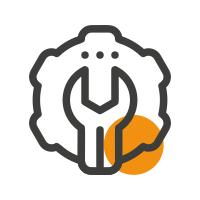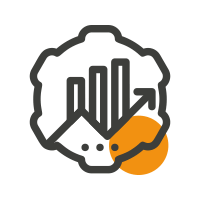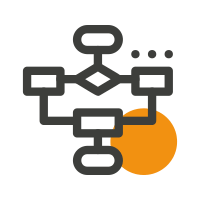Transform Your Business with Quality Leads: Search Traffic Success
More Leads, Higher Conversions
Grow Your Online Business with Lead Generation
Before we dive into the specifics of lead generation through Google Ads, let’s first define the term “lead generation” and why it is important for your business.
Lead generation is the process of attracting and nurturing potential customers, with the ultimate goal of converting them into loyal customers.
The key is to generate not just any leads, but quality leads that are more likely to convert into customers. Quality leads are those who have shown interest in your products or services and are more likely to be receptive to your marketing efforts.

Outbound Lead Generation
Outbound lead generation uses tactics like cold calling, advertisements, and trade shows to push people towards a business

Inbound Lead Generation
Inbound lead generation focuses on pulling potential customers towards a business using inbound marketing channels like social media, blog posts, and videos.
Why should you invest in lead generation?
Investing in lead generation can help your business attract a higher volume of qualified leads and successfully convert them into paying customers. By leveraging cost-effective marketing strategies and valuable customer insights, you can optimize your marketing efforts, drive better sales performance, and gain a competitive edge within your industry. Don’t miss out on the opportunity to grow your business and increase revenue with lead generation!
Types of Leads
MQLs come from your marketing efforts, such as offering a downloadable guide. These leads often aren’t ready to connect with your sales team. They’re in the early stages of the buying funnel.
SQLs show an immediate interest in your products or services, such as by submitting a quote request or a contact form. They usually want to speak to your sales team and occupy a lower stage of the buying funnel.
PQLs demonstrate an interest in your products or services, such as by signing up for a free trial. They usually take action after trying your products. A PQL may contact your sales team to ask questions and learn more about your offerings.
Service qualified leads have an active interest in your products or services because they already use and pay for them. These types of leads will usually contact your sales team about making an upsell, such as by choosing a different cable or Internet plan.
our approach
Lead Generation Services for Your Online Business
The metrics that matter – Scale your leads online with our Lead Generation Services.
Customer Acquisition Costs (CAC)
30% is the average reduction we see in CAC (in 3 months) from the day we manage it. Reduce your customer acquisition cost with our expert management of Google Ads and Shopping campaigns.
Average Order Value (AOV)
28% is the average increase in AOV we achieve in a 12 month span. Boost your average order value with data-driven insights, including order bumps, bundling, and upselling, expertly identified by our team.
Customer Lifetime Value (CLV)
We grew customer lifetime value, on average across all industries we have grown CLV by over 55% in an 12 month period. Increase your CLV with referral programs, personalised campaigns, and full funnel content marketing.
Conversion Rate
68% is the average increase in conversion rate on all Google Shopping campaigns we manage (within a 12 month period), through a suite of optimisation activities like revamping abandon cart sequences or improving product landing pages.
We make your life better
Let our lead generation experts to scale your online business
If you’re looking to attract quality leads and convert them into paying customers, our team of experienced professionals specializes in providing lead generation services tailored to businesses like yours. By leveraging our expertise, you can effectively attract more qualified leads to your online business and drive increased traffic and sales.
In conclusion, lead generation is a cost-effective marketing strategy that can help your online business achieve its goals. By optimizing your marketing messages to resonate with your target audience, you can gain valuable customer insights and see a better return on investment (ROI) to achieve long-term success and growth for your business.

Accurate Decisions
Our team of experts uses data and analytics to identify key insights that help you make informed decisions on how to optimize your Google Shopping campaigns.

Optimisations
We provide end-to-end management of your campaigns, from strategy development and product feed optimization to ad creation and performance monitoring.

Growth Mindset
Embrace a growth mindset with our continuous optimization and improvement of your ads. We have a relentless focus on achieving sustainable growth for your business.

Strategic Approach
We take a comprehensive view of your business goals and target audience to develop a tailored approach. Stand out in a crowded marketplace.
PPC (Pay-Per-Click) lead generation is a digital advertising strategy aimed at attracting potential customers who are likely to convert into paying clients. By creating targeted ads that appear in search engine results or on relevant websites, PPC campaigns direct traffic to specific landing pages designed to capture leads. This method is particularly reliable because it targets users who are actively searching for products, services, or information relevant to your business. In essence, PPC lead generation serves as a funnel to guide prospective customers from initial interest to actionable leads, thereby boosting the chance of conversions.
PPC, or Pay-Per-Click, is a potent avenue for driving targeted traffic to websites and is particularly effective for online lead generation initiatives. In contrast, lead generation, commonly abbreviated as “lead gen,” is the broader practice of attracting and converting potential customers who meet specific criteria, making it a necessity for businesses that require qualified clientele. Essentially, PPC is a specific tool used to boost lead generation, whereas lead generation is the overarching strategy to attract and qualify potential customers.
Acquiring high-quality leads involves multiple important factors:
- Addressing a Problem: Your lead should be seeking solutions to a challenge, showing a genuine need for your service or product.
- Demonstrates Authentic Interest: The lead should display genuine curiosity in what you offer, increasing the likelihood of conversion.
- Acts Promptly: A sense of urgency in their response often indicates a serious interest, making for a more qualified lead.
- Resembles Current Customers: Leads that share characteristics with your existing clientele are often of higher quality.
- Holds Influence or Can Access It: A lead with decision-making power or who can influence decision-makers is usually a high-quality lead.
- Utilise Surveys: Questionnaires can help screen leads, allowing you to focus on the most promising ones.
- Produce Quality Content: Great content can attract a more engaged and interested audience.
- Automate Responses: Using automation for lead responses ensures timely engagement, increasing the odds of conversion.
Securing high-quality leads is pivotal for multiple reasons, most notably for improving your probability of business success. Quality leads save both time and resources by narrowing down the pool to potential customers most likely to convert, thereby enhancing your return on investment (ROI). Understanding your target demographic deeply and deploying focused marketing strategies are essential for acquiring such leads. Moreover, prioritising lead nurturing strategies helps in maintaining engagement with these high-value prospects, setting the stage for business growth and long-term success.
Converting leads into viable business entails a multi-pronged approach:
- Craft Quality Content: Offer value-driven content that educates and engages your target audience, establishing your brand as an authority in the field.
- Implement SEO Strategies: Optimise your website for search engines to increase visibility and attract more relevant traffic.
- Design Compelling Landing Pages: Create landing pages that are visually appealing and focused on conversion, offering clear calls-to-action.
- Leverage Social Media: Utilise platforms like Facebook, Twitter, and LinkedIn to attract and interact with potential leads.
- Execute Niche-Specific Email Marketing: Use tailored email campaigns to nurture leads in your target industry, offering them useful information and exclusive deals to move them closer to conversion.
By integrating these tactics, you increase your chances of converting high-quality leads into profitable business relationships.
One of the primary benefits of incorporating PPC (Pay-Per-Click) into your lead generation approach is its cost-effectiveness. Typically, initiating a PPC campaign is free of charge; all you need is a modest monthly budget for your paid advertisements. This makes it an accessible option for businesses of various sizes, allowing you to precisely manage your spend while attracting targeted leads. By being so financially flexible, PPC provides a valuable avenue to generate high-quality leads without requiring a substantial initial investment.
The lead generation lifecycle outlines the journey a prospective customer undertakes from their initial interaction with your brand to the point where they make a purchase. Anyone who engages with your brand is a potential lead, yet only a fraction of these will ultimately convert into paying customers. The lifecycle helps in understanding various stages of customer interaction, from initial awareness and interest to active consideration and finally, conversion. This multi-step process aids businesses in effectively targeting and nurturing leads at each stage, thus increasing the chances of successful conversions.
Lead stages refer to the varying positions a potential customer occupies within your sales funnel, based on their level of engagement and likelihood to make a purchase. These stages help in outlining a structured sales process, allowing you to formulate targeted strategies for advancing leads towards conversion. By clearly defining lead stages, you can better plan and execute the necessary steps to nurture and push leads through the funnel, thereby increasing the likelihood of successful transactions.
There are principally two main types of leads: Inbound and Outbound leads. Inbound leads are those where the individual initiates contact with your business through various online channels such as your website, online referrals, social media platforms, or blogs. This form of lead generation is often consumer-driven and typically indicates a higher level of interest or engagement with your brand. Outbound leads, on the other hand, result from efforts made by your business to reach out to potential customers through means like cold calls, emails, or advertising. Both types have their own merits and can be crucial components of a balanced lead generation strategy.
A lead generation campaign is a structured approach aimed at capturing interest in a product or service with the goal of acquiring leads. It involves a well-thought-out strategy that leverages specific media sources and offers to generate inbound leads. Typically, such campaigns use a mix of digital channels like social media, email, or SEO, along with targeted messaging and compelling offers to entice potential customers into engaging with your brand. The ultimate aim is to convert this interest into tangible leads that can be nurtured through the sales funnel towards becoming paying customers.

